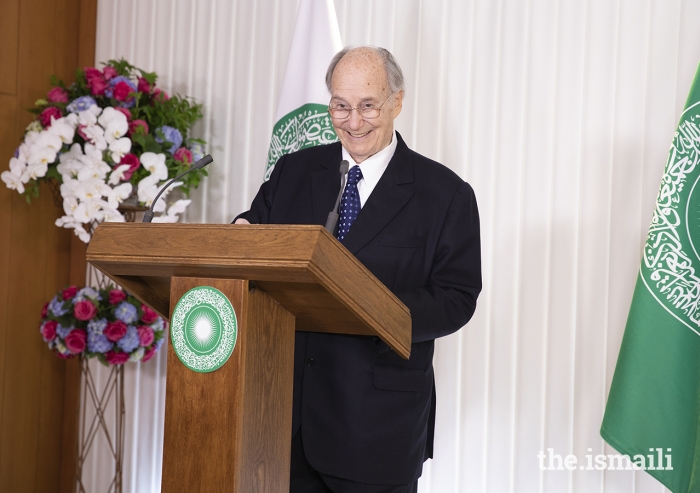Remarks by His Highness the Aga Khan upon receiving Die Quadriga 2005 Prize
“I am fortunate to lead an international community with a strong social conscience. Bridging North and South, East and West, the Ismailis have a long tradition of philanthropy, self-reliance and voluntary service. Wherever they live, they faithfully abide by the Quranic ethic of a common humanity and the dignity of man. They willingly pool knowledge and resources with all those who share our social ethic to help improve the quality of life of less fortunate men, women and children.”
I am deeply touched by the generosity of the remarks by President Karzai, an honoured Die Quadriga alumnus. His engagement and foresightedness are an inspiration to the Afghan people as they reclaim their proud nationhood and struggle to build a future of promise. We salute them and stand shoulder to shoulder with them.
Thank you also, President Mkapa, for honouring us with your presence. Yours has been an exemplary leadership for your people’s fight against poverty, and their commitment to peace and harmony at home and within the region.
I am delighted to return once again to Germany on a day that marks the nation’s reunification and its commitment to a strong democratic future.
It is a great honour to be among the distinguished recipients, past and present, of an award which celebrates the four virtues of harmony, friendship, valour and state wisdom. An enduring foundation of societal welfare, these values are at the heart of the ethics of Islam that guide the institutions of the Ismaili Imamat. The Die Quadriga organisers and sponsors are to be highly commended for seeking to uphold them for global peace and progress.
I accept the “United We Care” Award with much gratitude, and still greater humility. The credit for it belongs to many.
I am fortunate to lead an international community with a strong social conscience. Bridging North and South, East and West, the Ismailis have a long tradition of philanthropy, self-reliance and voluntary service.
Wherever they live, they faithfully abide by the Quranic ethic of a common humanity and the dignity of man. They willingly pool knowledge and resources with all those who share our social ethic to help improve the quality of life of less fortunate men, women and children.
This is the impulse that drives the Aga Khan Development Network, the AKDN. To understand this dimension of the religious office I hold, one must appreciate that Islam encompasses both the spiritual and the secular. This unity underpins an unrelenting effort towards an equitable order, where the vulnerable are helped to regain the dignity of self-fulfilment.
Long active in sub-Saharan Africa, the Middle East, South and Central Asia, the AKDN agencies and programmes help advance human development – cultural, economic and social. Experience convinces us that human progress can only be achieved and sustained when it is anchored in grassroots institutions of civil society, able to harness merit and build on pluralism, as bedrocks of democracy. We assist in building these organisations as well as for-profit institutions.
Our horizons, therefore, are long-term, promoting local capacities for self-development. The emphasis on cultural values helps people manage forces of change.
Many national and international, public and private, development agencies support our activities, in partnership with thousands of dedicated volunteers and professionals from different faiths and cultures. The German government works with us in strategically critical regions.
We are encouraged the World Bank has identified AKDN programmes, as far afield as Pakistan, Tajikistan and East Africa, as examples to scale up for global poverty reduction.
This Award is, therefore, a tribute to many: our institutional and individual collaborators, our volunteers, and, above all, to all those who struggle hard to take charge of their own development and destiny.







